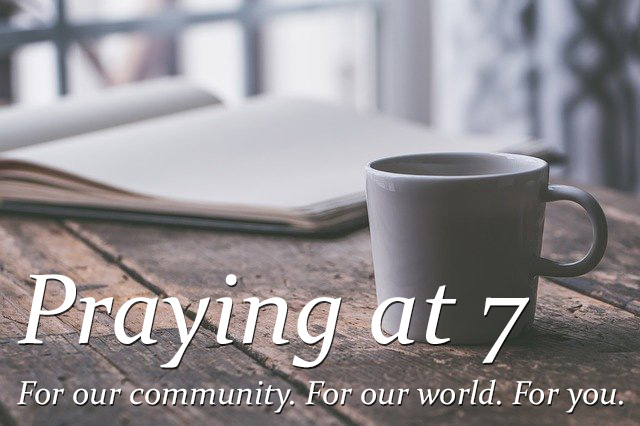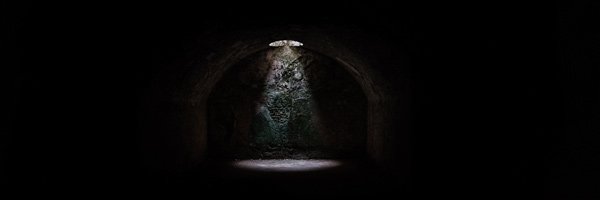Tag: hope (Page 2 of 5)
If we had conducted a survey in January asking what the greatest needs of our community are, I doubt we would have had a single person say, “What this community needs is another online church.” Or “What this town needs is for all of its churches to broadcast their services on Facebook Live. That will really help our community.” Yet, here we are. Thousands of churches have, in a matter of weeks, gone from being face-to-face only to entirely online. Most, out of necessity, have largely taken their previous worship format and moved it online, with few actual structural changes. First, this is has demonstrated the incredible resiliency of the church to change to address current cultural realities. We often feel like we cannot change and are fearful of change. We have learned it is possible and we can do it. Still, in the midst of our changes what we have not done is asked the questions, why are we doing what we are doing? Is this the most effective method of serving our church and the wider community? What new strategies, tools, and practices need to be implemented to serve in this new reality effectively?
We have all seen the pictures of people evacuating from an airplane crash dragging their carry-on luggage behind them. Despite everyone being told in the in-flight briefing to leave these items behind. The reason we are told to leave our laptops is that grabbing our stuff in a crisis slows the evacuation and threatens the life of our self and other passengers. People have died because someone could not leave their rolling suitcase behind. I recently heard of further research conducted into firefighter deaths in structural and range-land fires. What was found was that, in many cases, firefighters could have escaped the fire if they had put down their tools and gear and evacuated. What kept a range-land firefighter from getting to the next ridge from safety was their heavy packs on their backs or chainsaws still in their hands. If they had dropped the tools they were carrying, equipment that was essential for their job, and moved quickly to the next ridge without the weight encumbering them, they would have significantly increased their chance of survival. What do these illustrations have to do with the church? We are in a time of crisis, and many of us have instinctively held onto our tools, instead of dropping them and moving to the new reality. If we are going to climb the new ridge into effective ministry, we are going to need to let go of our old tools. These tools were effective and essential in our past ministry world but are no longer useful in this new crisis reality. Bluntly, many of us in the church are dying right now and will die, because we are hanging onto our old tools and trying to carry them up the next ridge to safety.
What are some tools we may need to let go of? I am sure you can think of more, and I would love to hear what you are seeing. Still, just a few I can think of include, large group gatherings, elaborate programmatic driven children’s ministries, refined efficient worship services led by professionals on the stage, and professional clergy as the dispensers of religious goods and services.
To say it all another way: A chainsaw is an excellent tool for cutting down trees, it is a terrible tool for washing your car. We would do well in this new reality, to put down our chainsaws and pick up a basin and towel and get to work meeting the real needs of our communities. And if the day should come we need a chainsaw again, we will always be able to find one.
Blessings,
Stephen
The habits we practice give us strength in uncertain times.
Each morning we at Hope are meeting online via Facebook Live on Hope’s Facebook page to pray together for our day, community, nation, and world. All are welcome to join us.
Daily prayer guides are available for each day and may be downloaded from this page. Return here each morning to follow along as we pray.
Hello Friends,
I want to share with you three questions you may use in your own personal reflection as well as to discuss as a family to help process the experience we are all having at this time.
(1) What has the coronavirus taken away from me today?
This question acknowledges and gives us permission to grieve. The virus has taken some things away from all of us that we will not get back.
(2) What has the coronavirus not taken from me today?
When it feels like the whole earth is shaking underneath us it is good to see and grab onto that which is not moving. This question raises our awareness of the things that remain. Much has changed. Much remains the same.
(3) What has the coronavirus given to me today?
This question reminds to live as persons of gratitude. Even in the midst of suffering, there is hope.
I have found these helpful to recenter and refocus on that which is important. I hope you find them helpful too.
Blessings,
Stephen
SOURCE: These questions were originally part of a webinar hosted by Fresh Expressions, "Light in Dark Times: Healing Souls During the Pandemic and Beyond" and came from from Jared Mackey, senior pastor of The Sacred Grace (Denver, CO)
This afternoon I stood alone in our church sanctuary. I looked around me at the musical instruments that have gone silent, the screens that are dark, and the empty chairs. I saw our communion table and anointing oil sitting, waiting, for our return to celebrate and feast together. I wondered what it will be like to come back. Then as I sat in our dark space set aside for worship I began to wonder.
What if we re-imagined church in light of COVID-19?
This virus which is currently raging around the globe is shaking and changing our paradigms for ministry. It is not the first pandemic to ravage our globe, however, it is the first to strike the U.S. with such intensity in our lifetimes. This is causing many of us to question and ponder our sense of what is normal.
What if this is our new reality for the church? Some have postulated the questions and theories that this could be the beginning of seasonal pandemics. What if long periods each year or every few years of being “closed” or unable to meet in our buildings becomes our new reality?
What would be different about the way we do and think about church?
I will go on the record to say that I think the predictions are a little draconian. I believe, however, the questions that come out of them are essential to our future.
What would the church do differently if we met face-to-face nine months out of the year and virtually for three?
What is it that keeps us from doing these things now?
Finally, even as we think about these things, I want to leave you with a message of hope. This comes from the pen of a friend whose wisdom I value greatly:
Corona Virus: Finding a Realistic Hope Amid Hopelessness
“…all of us can find a realistic hope amid hopelessness.”
Stephen

Dear Friends,
As we journey through Holy Week at Hope we are meeting online via Facebook Live on Hope’s Facebook page. To pray together for our day, community, nation, and world. All are welcome to join as we:
Pray Together on the Sevens
7:00 AM CDT
7:00 PM CDT
Additionally, please download the daily prayer guides to participate together in this time of prayer.
Return to this page each day to download and use them in our times of morning and evening prayer.
Looking for the latest prayer guides?
They have been moved here.
Dear Friends,
As I practice my social distancing I have been reading and thinking a great deal about what is next for the church. In my reading I came across this quote I want to share with you:
For years, the mission of the church in the United States was largely defined in terms of offering attractive programs to retain its members, building appealing structures and services to draw new members, and participating in some type of benevolent pursuit to appease the conscience of the few individuals looking to make a difference in the world . . . recent developments have contributed to a rediscovery that the mission and purpose of the church do not stem from charting institutional health through traditional quantifiable metrics. Rather, the Church ought to understand its role primarily as a partner and co-participant in the mission of God, whose desire is to redeem humanity, restore creation, heal brokenness, and invite Christians everywhere to embrace their true identity in Christ. (Twibell 82)
Years ago I was at a church event where the host church was celebrating their opening of a children’s play area. They proudly announced how many kids in the community had come onto their turf in the last year. I commend the church for its desire to do something for the community. As I drove around the community I could not help but wonder, “Is this really what the community needed? Did they need it most on the church’s turf? What could the impact have been if they had built in another part of town and resisted the temptation to brand it with the church’s brand? What if it had been about the community rather than the church?”
I know these are hard questions, and some might even say unfair, but as a pastor, I see regularly that people are tired of our efforts to attract them to come to our events. We have lost people’s trust. They are onto our games.
And now we, the Church, have been given a great gift. We have nothing to invite them to. Our buildings are closed, our programs suspended. All we have to offer is ourselves, our love, our compassion, our concern, our generosity. We have nothing to offer but Jesus who, when saying why he came, quoted from the prophet Isaiah and said:
The Spirit of the Lord is on me,
because he has anointed me
to proclaim good news to the poor.
He has sent me to proclaim freedom for the prisoners
and recovery of sight for the blind,
to set the oppressed free,
to proclaim the year of the Lord’s favor.
(Luke 4:18-19, NIV)
I am concerned whether we are learning from the lessons this time is teaching us. What if, when we are finally released to “life as normal” we don’t go back to our old ways? What if, instead of expecting people to come to us on our terms, we went to them on theirs? What if we continued to live outside our walls seeking to find new and ever more ways to love and serve our community joining in the mission of God to “redeem humanity, restore creation, heal brokenness, and invite Christians everywhere to embrace their true identity in Christ?”
What if?
Blessings,
Stephen
SOURCE:
Twibell, Simone Mulieri. “Missional Act in Spiritual Formation: Moving Beyond Mission Trips into the Realm of Missional Living.” Missional Disciple-Making, edited by Michael J. Breen and David M. Gustafson, 3DM Publishing, 2019, pp. 82–104.
A note to those who receive The Milk Can but are not part of Hope:
As we seek to understand and find the best platforms to support the people of Hope, the church Laura and I pastor, through this very unique time in our country, I have made the decision to make use of The Milk Can as a place to share and post our regular updates to our congregation. With that said, please know you will start to receive more “in house” messages than in the past, and more frequent ones. If you feel like your inbox is getting clogged please know it is okay to unsubscribe. At the bottom of every message are the instructions. Stay safe, stay well, never lose hope in the Kingdom of God. – Stephen
===
Dear Friends,
In Joshua 3 and 4 the people of Israel, after forty years of wandering in the desert, walk across the Jordan River on dry ground into the Promised Land for the first time as a nation. Before the waters returned to their flow Joshua chose twelve men to each go into the center of the river and carry out a large rock. These stones were set up as a memorial to future generations of God’s faithfulness to his people. Faith is not an abstract wish or unfounded hope that things will become better. Faith is founded in experience. When future generations were tempted to question if God really cared about his people they could always look back to the twelve stones to remind them that their faith in God had a solid foundation. At least that was the plan. We know that in a short while the people lost their memory of God and turned to their own ways. They doubt the God who delivered them and placed their dependence in other nations, other gods, and themselves.
Daily we hear the message that these are unprecedented times for our nation. I do believe these are unprecedented times for these generations, but they are not unprecedented times for our nation and for humanity. We have faced times of scarcity in the past. We have felt the weariness and tension of extended anxiety. We have felt helpless before. We have faced sickness and death. We have known darkness, fear, and doubt. And we have experienced hope and light on the other side. We have known that God is good and loving.
I believe, part of the challenge we are facing today, as a nation, is that we have lost the collective memory of the faithfulness of God. The twelve stones have become worn with time and their story forgotten that God is faithful in the days, weeks, months, and years of waiting. I know we all want to get back to normal. I believe we are only just beginning this journey through darkness. There are those, though, who can teach us how to walk it. Some around us have stories to tell us. To give us hope. Many refugees know what it is like to suffer long and experience the provision of God. Families who have sent their sons and daughters off to war know the unrelenting anxiety and worry waiting for that which they dread the most. They can teach us the experience of joy in the morning and God’s mercy in loss. And there are others who can teach us. Perhaps even you have a story you would be willing to share with others of faith in the darkest of times?
Before I close this message I want to suggest one book to you to read. The book is The Hiding Place by Corrie Ten Boom. It is a story of hard faith in the long dark days of WWII.
Blessings,
Stephen

After months of searching and agony, you finally find the perfect car. It’s seafoam green and paneled in wood. The day comes for you to proudly take it for an inaugural cruise down Main Street. People stop and stare. Children let go of their balloons and drop their ice cones as you glide by. Dogs are even distracted away from the squirrels they were chasing. Then, as you burst with pride, horrifying terror passes just in front of you. It is another seafoam barge with wood paneling gliding through the intersection. Choking on your triple-shot soy raspberry latte it is then that you see them. Everywhere you look there are cars just like yours. Dejected you struggle to come to terms with the reality that your thing of mechanical beauty will not be the singular object of humanity’s desire you had hoped it would be. Why didn’t you see them before? Simple. You were not looking for them. Now your perspective has changed and you see what has always been there.
This post really is not about freighter cars with faux wood accents, it’s about what seeing what we are looking for. Proverbs 1:27 says, “Whoever seeks good finds favor, but evil comes to one who searches for it” (NIV).
Every second of our world is flooded with thousands of images. We hear stories of doom, gloom, and demise. Daily we cross paths with people that speak, see, act and think differently than we do. In nearly every interaction we make a choice, most of the time without even thinking about it, to see good or to see evil. My challenge is to consciously choose to see the good rather than search for the evil. In doing so we find and give favor. Yet, when I seek evil, to see and think the worst in others, I will be sure to find it, even if all the evidence that exists is to the contrary. So today choose to seek and find the good and don’t be surprised if it is a lot harder than expected to carry out. We are all in this together, because, like all things we preacher types write and speak about, it is far easier for us to pontificate than to actually live out.
Blessings,
Stephen






